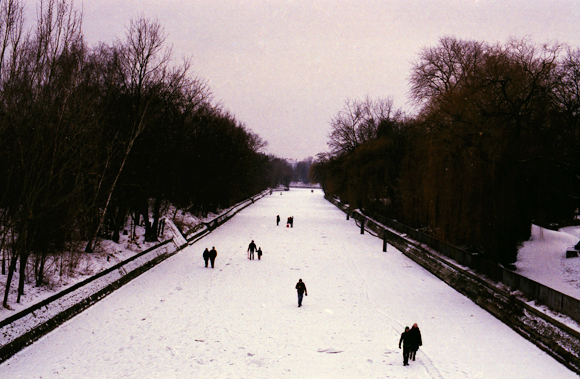Berlin seemed like the obvious choice. I had taken German classes for three years, and had been incubating visions of myself as an artistic, experimental person. Based on breathless reports from friends, the city seemed a stand-in for New York in the 70’s and 80’s. Cheap rent, temporary galleries, nightclubs that never closed—I pictured a city covered in the graffiti Giuliani had scrubbed away, yet cleansed of students from NYU—and paved with black leather catsuits and crushed bottles of pilsner.
To justify the trip, I had taken time off from school and secured an internship with a local arts magazine, called BPIGs, which somehow stood for Berlin Independents Guide. After a jet-lagged night in a hostel, I planned to wake up, drop off my giant backpack across town in my sublet room and then head to the magazine’s office. Without a smart phone, or even a cell phone that worked in Germany, I relied on print-out directions from Google. By the time I arrived at my sublet apartment on Weichselstraße, I realized I would soon be late for what was supposed to be my first official meeting. I threw my bag by my bed and ran out the apartment door, back to the U-bahn.
When I emerged from the station an hour later, I found myself on the gray banks of the Spree, in a neighborhood that seemed oddly starchy for an underground arts magazine. I ran up and down the empty street, tucking my chin against the January cold, scanning the building’s blank facades for the address, but none of them were quite right. It was now 3:00 in the afternoon, and I hadn’t managed to find the place. More than honesty or integrity, punctuality is the highest German virtue, and with each passing minute, I felt my chances of making a good impression dribble away. This internship was my only ostensible reason for being in the city, and it seemed I was going to squander it.
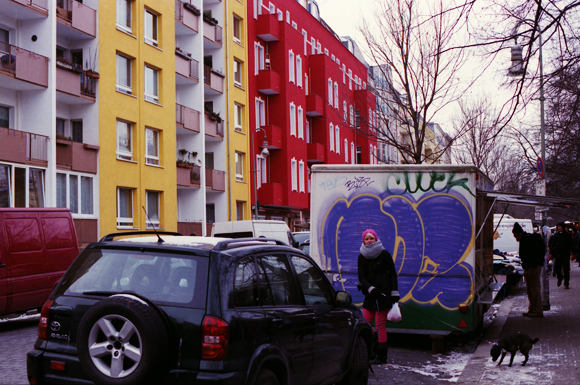
Finally, I found what looked like the right building, but I realized that I didn’t know which floor I needed. The front desk would tell me, I assumed, but when I reached the doors of the building I found them locked. There was another door to the right, leading into a strange perforated metal shell, which was somehow attached to this older 19th century limestone. I found the buzzer panel, and began systematically pressing the silver buttons. Most didn’t elicit a response, but a few people garbled exasperated German questions at me, ending summarily with, “I don’t know what you’re talking about.”
A man leaving the building opened the door, and I darted inside before it shut. The interior of the place wasn’t really an interior at all, but a kind of halfway space between indoors and out. The perforations let in the cold, which I tried to suppress by bundling my scarf tighter and running up the stairs. At this point, beyond reason, I began knocking on random doors. Again, most greeted my knocks with silence, but on the fourth floor, an older gentleman opened the door. He explained that the person I was looking for did not live here, and that he had never heard of this BPIGs. I realized I would have to email my boss when I got back to the apartment and explain the mix-up. A hand squeezed my shoulder and turned me around; it belonged to a stern-looking security guard.
“How did you get in this building and what are you doing here?” he asked me. “This building is owned by the Belgian consulate. People who work in the consulate live here. It is a secure area. You need to leave immediately.” He escorted me down three flights of stairs and out the door.
So I headed back to my new sublet, feeling too angry and sorry for myself to bother buying a train pass. How had I gotten the address wrong? How was I going to explain this to my boss? Halfway home, I noticed the police had boarded the train and were asking each person, “Haben Sie eine Karte?” Other passengers took out their wallets and showed their monthly passes, then went back to staring blankly out the U-bahn windows. Now it was my turn, the two cops approaching, one clean-shaven, the other with a bristly mustache. “Haben Sie eine Karte?” they asked.
“Entshuldigung?” I said, hoping my confused tone mixed with a request for pardon would save me from a fine. They frowned, then took me off the train at the next stop. I wondered if I would be arrested on my first day in Berlin. Did German police arrest fare-beaters? They marched me to an ATM, and requested I withdraw the money for the fine right there: 80 Euros, more than a monthly pass. The one with the mustache folded the bills and put them in a kind of police fanny-pack. “Don’t let it happen again.”
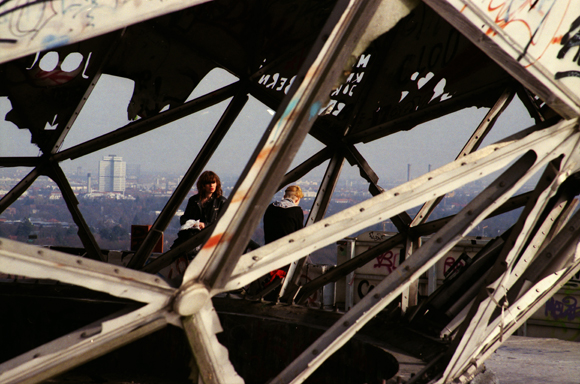
“Entshuldigung” would become my favorite word for the next three months, perfect for any encounter, and usually the only word I needed to begin and end a conversation. I even used it in an apology email to my new/not yet boss. In her reply, she explained that I’d be working from home anyway, so coming to the office wasn’t an issue. Also, I’d have to pitch whatever I wanted to write about; there’d be no assignments. Without the structure of a real job, I spent hours wandering around Berlin’s museums and trying to get my bearings. I amassed an enormous collection of postcards, which were the cheapest things you could buy at the gift shops: a bent aluminum chair from the Bauhaus museum, polaroid of a waxy-skinned model lounging poolside with a blow-up doll by Helmut Newton. The rest of the day went to forcing myself to read Gravity’s Rainbow (which I never quite finished), watching television on my laptop, and nursing drinks in Berlin bars, hoping somebody would talk to me, or at least acknowledge my “Entshuldigung” when we bumped into each other near the bathroom.
I had started the trip fancying myself a flaneur, but to be a flaneur, you have to know where you’re going, or to at least appear comfortable getting lost. The flaneur’s city should be, if not inviting, at least not openly hostile—or the flaneur is so indefatigable that he gets past this hostility and comes to know and love the city despite it. It is difficult to stroll in record lows; one more or less darts, every muscle in your body clenched, cursing yourself and this godforsaken city. I was less a Walter Benjamin than a Joseph Roth; I slunk along the walls of the city like a dog.
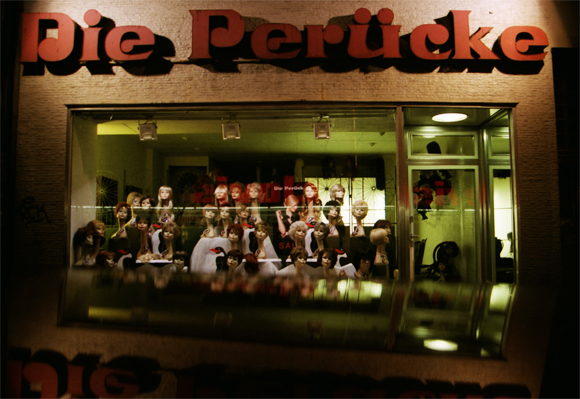
But while scuttling the shortest routes between subways and museums, I did begin to make sense of Berlin, mostly by translating it into New York. When I got lost, I no longer entered a state of nausea-inducing panic because I had developed this private game of equivalency. Hip Kreuzberg became Williamsburg. The stroller-crowded lanes of Prenzlauerberg: Park Slope. Mitte, with its luxury stores, faded art communes, and geographic centrality, a strange combination of Midtown and SoHo. Pieces of the city that didn’t fit into this logic I ignored, or relegated to a miscellaneous bin with items like Schwartzbier and Currywurst, waiting to be categorized and translated later. When living or traveling abroad, I suppose you’re meant to seek out new experiences on their own terms, but I spent most of my time attempting to integrate them according to a chauvinist vision of New York, explaining my tiresome theories to my temporary roommates when they came home from their jobs and classes.
They were foreigners, too, but they had each either adopted German ways or figured out how to avoid them. The model German roommate, Georg, rode his bike through the winter, chastised me for leaving breadcrumbs on the cutting board, and filled dish soap bottles with water to save money—while Claudia, an Italian student, managed to sleep all day and only socialize with other Italians. She thereby remained ebullient and perpetually late, in a bubble of fellow immigrants. She and her friends spoke more to me in one evening than anyone else did for the rest of my time in Berlin.
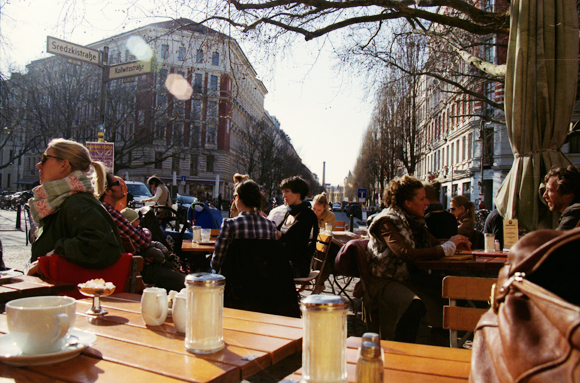
This was at the crux of my problem with the city—unlike New Yorkers, who are accused of being mean and selfish, but who will make eye contact on the street or yell at you if you step on their shoes—Berliners are ice cold, and silent. In bars across the city, they huddle in groups of two or three over tables lit with a single candle, staring into their mugs of beer or glaring suspiciously at the stranger who tries to strike up a conversation. Because of my blonde hair and the way I dressed, I could pass for a Berliner, as long as I kept my face neutral and my head down. But when I tried to mutter a greeting at the bouncer of Berghein, he kicked me off the line.
“Nächst.”
Joseph Roth once called Berlin “freezing, even when it is sixty degrees,” but I’m willing to imagine that it’s a different city in different seasons. I’ve heard they have dozens of outdoor concerts in the summer, that people gather in beer gardens for hours, wander along the canals, stroll in the Tiergarten. It is still rumored to be a sociable town, abuzz with talk of art, culture, politics. Yet when I came back to New York at the end of March, I found my German worse from disuse than when I’d left. Friends who’d studied in provincial Freiburg tried to talk with me, but I would only clam up and offer excuses. I told them my German had hardened in Berlin from being left in the cold.
*****
Daniel Penny is a writer, editor, designer, and photographer currently pursuing an MFA in creative nonfiction at Columbia University. He teaches a nonfiction workshop at Columbia, and is working on a collection of essays and a book of poetry. You can follow him on Twitter here.
Photo credit: Daniel Penny

